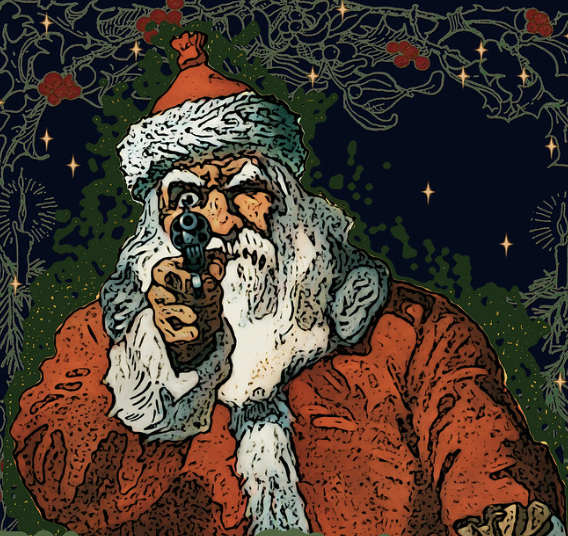'Christmas Vacation' Is A Takedown of Capitalism

There's a specter haunting National Lampoon’s “Christmas Vacation” – the specter of communism, or socialism, or maybe just a general leftist hostility toward capitalism.
Some of our most vaunted Christmas movies assail the very underpinnings of the consumerist machine churning furiously at the heart of this season of gluttony and consumption for consumption's sake. "A Charlie Brown Christmas" is little more than a skewering of Christmas consumerism with a thin religious veil. "A Christmas Carol," in all its cinematic iterations, is downright hostile to the supremacy of capital, positing that a more equitable society is only achievable through threat of life and limb against the monied class. "It's a Wonderful Life" is the story of an ice-cold capitalist predator threatening the well being of working families, featuring George Bailey, the people's hero.
But no holiday film confronts the vicious class struggle created and inflamed by the logic of capital better than National Lampoon's "Christmas Vacation," wherein the capitalist dream – the American dream – is skewered, mocked, and vilified amid cartoonish hijinks and Chevy Chase's goofball one liners. Watch "Christmas Vacation" through a critical lens and you'll see that it's not just a source of holiday laughs, but a Marxist critique of capitalism and class struggle in the United States.
Such a critique goes best with eggnog served in a moose head-shaped glass. Naturally.
Subscribe to Bad Faith Times for free or support BFT with $5 a month.
Chevy Chase And All The Marxist Archetypes
Clark Griswold: The pitiable chaser of the American dream – and all its hollow, materialistic promise – Griswold represent what's known in Marxist literature as the petty bourgeoisie, a sort of in-between class that shares some interests with the lowly proletariat, but often aligns itself with the bourgeoises, or capitalist ruling class. Clark, an inventor working for a giant U.S. corporation, belongs to a class of small proprietors and handicrafts folks living more comfortably than the proletariat, but still far from the power and luxury of the bourgeois life.
Clark's allegiances, therefore, are constantly divided. The internal struggle is at the source of much of the movie's comedy, as Clark strives for what he believes to be a classic Christmastime – the one he experienced as a child in the 1950s. Almost everything he does is a strategic move to exit the petty bourgeoisie and join the rulers in their mansions and gated communities, cozying up to those above him on the class ladder, pandering to them, kissing their asses.
While Clark wears a happy face through most of his misadventures, class-based resentment simmers just beneath the surface. It's there, always, eating away at Clark as he conducts his life the way a middle-class American does: by gaining a little wealth, a little land, a little security, and holding on to it with a death grip. The resentment burns through in his office encounter with his boss, Frank Shirley, and Shirley's army of yes men, marching through the workplace like a fascist army and talking down to Clark, who is desperate to please, to be recognized by his class superiors.
Clark grits his teeth as the wealthy businessmen walk away from him, telling one of the penguin-clad army to kiss his ass. Clark is bitterly resentful of his position between two classes he loathes: the bourgeoisie and the proletariat, otherwise known as Cousin Eddie and his family.

Cousin Eddie: Clark's slovenly, broken down relative by marriage is the representation of what is known in Marxism as the proletariat, a word deriving from a Latin term referring to someone who had no property save his or her children. Dear Cousin Eddie, as you may know, shows up on the Griswolds' doorstep with nothing but, well, his wife and children. Cousin Eddie has no job, no money, he's lost his home, and he's living in an RV he drove to the Griswolds' house, coasting in on fumes.
The cheerful proletarian has few, if any possessions beyond a classy black dickey, and has nothing to sell but his labor. Could one better define Cousin Eddie? One could not. The Griswolds, that grand representation of the petty bourgeoisie, view Cousin Eddie and his family with something bordering on disgust and disdain. Clark is horrified by what he sees as Eddie's backward ways, his nightmarish hygiene and habits, and his lack of motivation to advance beyond his lowly means, into a more respectable class in this capitalist cage match we call life. Sure, Clark is generous to Eddie and his family – buying what could be hundreds of dollars worth of dog food and offering to buy Christmas presents for Eddie's kids – but his perception of Cousin Eddie, that content, bedraggled member of the proletariat, could hardly be dimmer.
Cousin Eddie and his family represent the second time the Griswolds encounter the proletariat in "Christmas Vacation." It's in the movie's opening scene that the Griswold family, singing Christmas carols in their middle class stationwagon on the way to chop down a Christmas tree, are tailgated by a rusty old pickup truck driven by disheveled men who then try to outrace Clark's wood paneled family mobile. The metaphor could hardly be clearer: Clark refuses to let the bearded proletarians pass him on the highway, just as a member of the middle class lives in constant fear – crippling paranoia – of being passed economically by those below him. Clark hates them not only for harassing him and his family on the open road, but for daring to challenge his supremacy in the capitalist pecking order. He’s willing to die before ceding ground to these working class troglodytes.
Margot and Todd: This quintessential 80s couple, the Griswolds' next door neighbors, are tough to peg in looking at this movie through a Marxist framework. I think we can dub them another member of the petty bourgeoisie, who differ from Clark and his family in that they do not hide their hatred for the working class and all its trappings. Just as Clark is disgusted by Cousin Eddie and his family, Margot and Todd – whose yuppie lifestyle can be described as soullessly sterile – see Clark as a loathsome caveman unworthy of their respect. Margot and Todd may be in the same 'tweener class as the Griswolds, but they have no compunction about turning up their noses at the proletariat and identifying as a member of the minuscule monied class. This, in short, is why it's so deeply satisfying for us to watch this couple's house vandalized as their misery and insecurity is exposed by the chaos emanating from Clark's house. It's fun to hate Margot and Todd. I don't think that's a mistake in this Marxist propaganda film.

Frank Shirley: Finally we come to the living embodiment of the bourgeoisie, which derives from the French word for those who reside behind walls (Clark, before his diatribe against his Scrooge-like boss, actually refers to Shirley's home in a fabulously wealthy community). Perhaps most importantly in viewing this movie through a Marxist lens, Shirley is an incompetent, a total fool who belongs to the privileged minority that rules over the vast majority – Marx's central grievance and the lynchpin of capitalistic domination in western society. The movie offers a host of reasons to believe Shirley is bad at his job, focused only on maximizing profit for himself and his marauding corporation exploiting the labor of Clark and his fellow petty bourgeois.
Shirley, after demanding that Clark deliver a report to him, has no idea what Clark is talking about just days later when the corporate worker bee asks if the report was helpful to Shirley during a recent trade show. The bossman is, in short a dumbass. This aligns with Marxist literature's depiction of the ruling class as inept, blundering, yet dominant owners of the means of production.
"Christmas Vacation" offers a Marxist lesson in how the bourgeoisie can be conquered, a key precursor to the glorious dictatorship of the proletariat that dismantles the genocidal capitalist system – or in this case, to get some extra spending cash at Christmastime. Clark, in a fit of Christmas Eve rage after being robbed of his long-awaited holiday bonus check, howls that he would like his boss brought to him with a "big ribbon on his head," in hopes of telling his boss that he is indeed a greedy pig of a man. Shirley is cowed when Cousin Eddie kidnaps the corporate titan from his mansion, ties him up, and brings him to Clark, as Clark had wished (a slightly more modern Marxist critique might point to law enforcement's absurd show of force in response to a very rich man being abducted from his home, for the military has been an invaluable tool to masters of capital once those masters have been defeated politically). Shirley eventually admits that suspending Christmas bonuses was a mistake and that "these people called me on it" – pointing to the Griswolds and Cousin Eddie's family, the rare teaming up of the petty bourgeois and the proletariat, the upper middle class and the working class, who very often share economic interests but war nonetheless.
As Marx charged, communists’ aims “can be attained only by the forcible overthrow of all existing social conditions,” necessitating revolution against those at the very top of the economic food chain. It was only here that Clark was able to extract concessions from his wealthy boss. Collective action had won the day. Clark would get his precious end-of-year bonus so he could continue his idiotic pursuit of the American dream. Good for Clark.
Have you watched National Lampoon's "Christmas Vacation" a hundred times? Yes? Will you watch it any time it flashes across your TV screen as you're scrolling through channels like a zombie in the days and weeks before December 25? Is this Chevy Chase classic a hallmark of your holiday season experience? Does it make you feel warm and fuzzy in the glow of your family Christmas tree? Well, congratulations. You've been indoctrinated by Marxism. Happy holidays, comrade.
Follow Denny Carter on BlueSky at @dennycarter.bsky.social.


Comments ()